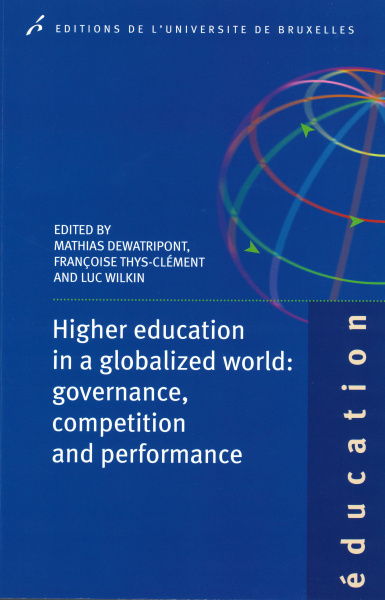Higher education in a globalized world: governance, competition and performance
First Edition
This book offers an improved understanding of European higher education, both from a scientific and a policy point of view. Read More
The analysis of universities is a topic which attracts more and more attention in social sciences, and especially in economics since the connection between the functioning of higher education and economic growth is increasingly recognized. The various chapters of this book are therefore interesting in a double perspective : from a “pure research” point of view but also, for many of them, from a public policy point of view. This is especially true for the first set of chapters, which focus on the organization of higher education systems, including (i) discussions of pleas for higher inflows of (public and private) money and for institutional reforms to improve their “value for money”; and (ii) evaluations of existing reforms, like the Bologna process which favors compatibility between teaching programmes and the mobility of students. The second set of chapters concerns the positioning of individual higher education institutions, with implications about their strategies stemming from the multi-tasking nature of their mission; and also analyses of individual researcher and student behavior, with an emphasis on topics like the role of career incentives of researchers, the adoption of new technologies by students or the predictability of their success rate. Whether the book takes a “systemic” or an “individual” perspective, it builds on a variety of approaches, from microeconomic theory to empirical methodologies, including econometric analyses as well as evidence collected from surveys.
The contributions presented in this book are samples of outputs from research questions that have been at the heart of a multiuniversity project – with researchers from Université Libre de Bruxelles, Facultés Universitaires Catholiques de Mons, Facultés Universitaires Saint-Louis, Katholieke Universiteit Leuven, Université de Mons-Hainaut, Universiteit Antwerpen and Université de Toulouse – funded by the Belgian Federal Science Policy Office (under its PAI/IAP Programme).
Specifications
- Publisher
- Éditions de l'Université de Bruxelles
- Edited by
- Mathias Dewatripont, Françoise Thys-Clément, Luc Wilkin,
- Introduction by
- Luc Wilkin, Mathias Dewatripont,
- Contributions by
- Philippe Aghion, Périne Brotcorne, Tom Coupé, Ilaria Faccin, Thomas Gall, Axel Gautier, Marcel Gérard, Caroline Hoxby, Doh-Shin Jeon, Stijn Kelchtermans, Patrick Legros, Andreu Mas-Colell, Domenico Menicucci, Nadine Meskens, Andrew Newman, Wilfried Pauwels, André Sapir, Valerie Smeets, Juan Francisco Superby, Jean-Philippe Vandamme, Frederick van der Ploeg, Eve Vanhaecht, Frank Verboven, Reinhilde Veugelers, Alexis Walckiers, Frédéric Warzynski, Xavier Wauthy,
- Language
- English
- Supporting Website
- Oapen.org
- Publisher Category
- Publishers own classification > Business & Economics
- BISAC Subject Heading
- BUS024000 BUSINESS & ECONOMICS / Education
- Onix Audience Codes
- 06 Professional and scholarly
- CLIL (Version 2013-2019)
- 3305 SCIENCES ECONOMIQUES
- Subject Scheme Identifier Code
- Thema subject category: Economics of specific sectors
Livre broché
- Publication Date
- 28 May 2018
- ISBN-13
- 978-2-8004-1635-9
- Extent
- Main content page count : 264
- Code
- 1635
- Dimensions
- 160 x 240 x 13 cm
- Weight
- 426 grams
- ONIX XML
- Version 2.1, Version 3
ePub
- Publication Date
- 22 May 2019
- ISBN-13
- 978-2-8004-1689-2
- Product Content
- Text (eye-readable)
- Extent
- Main content page count : 264
- Code
- 1689
- Epub Accessibility
- Table of contents navigation
- ONIX XML
- Version 2.1, Version 3
Google Book Preview
Contents
- Introduction | Djordje SREDANOVIC, Andrea REA, Emmanuelle BRIBOSIA, Isabelle RORIVE
- I. Diversity and Anti-discrimination Policies in North America and Europe
- Intercultural Relations in Plural Societies: A Comparative Perspective | John W. BERRY
- Diversity, Social Capital and Cohesion | Alejandro PORTES, Erik VICKSTROM
- A US Perspective on the Relationship of Immigration Restrictions and Racism | David B. OPPENHEIMER, Swati PRAKASH, Rachel BURNS
- Canadian Multiculturalism in Question: Diversity or Citizenship? | François CRÉPEAU
- Are Equality and Non-Discrimination a Double-sided Argument in the Intercultural Dialogue in Europe? | Emmanuelle BRIBOSIA, Isabelle RORIVE
- Willingness to File a Discrimination Complaint. Examining Socio-Psychological Aspects in Fighting Discrimination through Legal Means | Alejandra ALARCON HENRIQUEZ, Assaad AZZI
- II. European Integration Policies
- Integration Requirements in EU Member States | Yves PASCOUAU
- Testing the Limits of the Liberal Constraint: the Evolution of Civic Integration Policy in Austria | Julia MOURÃO PERMOSER
- The Role of the State and the Image of Migrants Debating Dutch Civic Integration Policies, 2003-2011 | Saskia BONJOUR
- Civic Integration as Symbolic Policy? The Case of the Integration Agreement in Italy | Tiziana CAPONIO, Gaia TESTORE
- Regional Divergence in the Integration Policy in Belgium One Country, Three Integration Programs, One Citizenship Law | Ilke ADAM, Marco MARTINIELLO, Andrea REA
- Biographical Notes

